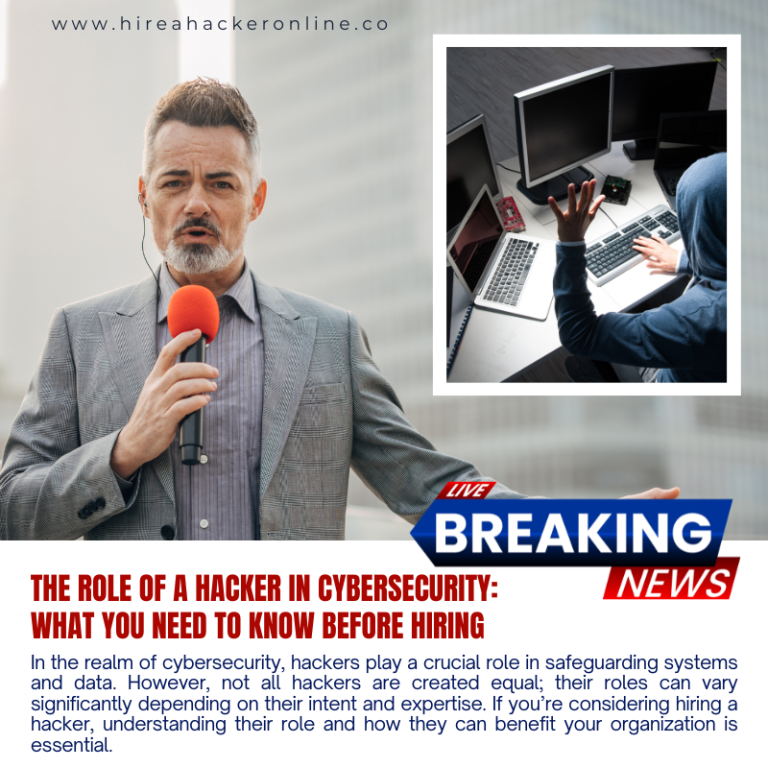In the realm of cybersecurity, hackers play a crucial role in safeguarding systems and data. However, not all hackers are created equal; their roles can vary significantly depending on their intent and expertise. If you’re considering hiring a hacker, understanding their role and how they can benefit your organization is essential. Here’s what you need to know before bringing a hacker on board.
1. Different Types of Hackers
Understanding the various types of hackers will help you identify the right professional for your needs:
- Ethical Hackers (White-Hat Hackers): These are cybersecurity experts hired to identify and fix vulnerabilities in systems before malicious hackers can exploit them. They operate within legal and ethical boundaries and often hold certifications like CEH (Certified Ethical Hacker) or OSCP (Offensive Security Certified Professional).
- Penetration Testers: A subset of ethical hackers, penetration testers conduct simulated attacks on your systems to uncover vulnerabilities. They provide detailed reports and recommendations for improving security.
- Red Team Members: These professionals perform simulated attacks and adversarial simulations to test the effectiveness of your security measures, often working alongside blue teams (defensive security teams).
- Security Researchers: They focus on discovering new vulnerabilities, developing new security techniques, and staying ahead of emerging threats. Their work often informs best practices and security tool development.
2. Key Responsibilities of a Hacker in Cybersecurity
When hiring a hacker, be aware of their primary responsibilities:
- Vulnerability Assessment: Identifying weaknesses in your systems, applications, or networks that could be exploited by malicious actors.
- Penetration Testing: Conducting controlled attacks to evaluate the strength of your defenses and identify gaps in your security posture.
- Security Audits: Reviewing your organization’s security policies, procedures, and technical controls to ensure compliance with industry standards and best practices.
- Incident Response: Assisting with or leading the response to security breaches, analyzing how the attack occurred, and helping to mitigate the damage.
- Threat Intelligence: Keeping up with the latest threats, vulnerabilities, and attack vectors to provide proactive recommendations for defense.
3. Skills and Expertise to Look For
When evaluating a hacker, consider the following skills and expertise:
- Technical Proficiency: They should be skilled in various programming languages, networking protocols, and operating systems. Familiarity with tools like Metasploit, Burp Suite, and Wireshark is also beneficial.
- Problem-Solving Abilities: A good hacker should be able to think like an attacker, using creative methods to uncover vulnerabilities and devise effective solutions.
- Certifications and Training: Look for recognized certifications that demonstrate their knowledge and expertise, such as CEH, OSCP, or CISSP (Certified Information Systems Security Professional).
- Industry Experience: Experience in your specific industry can be valuable, as they will be familiar with the common threats and regulatory requirements relevant to your sector.
4. The Importance of Ethical Standards
Ethical behavior is paramount in cybersecurity. Ensure that any hacker you hire adheres to the following:
- Legal Compliance: They must operate within legal boundaries and obtain explicit authorization before testing systems.
- Confidentiality: They should have strong policies and practices in place to protect sensitive information and ensure that data is handled responsibly.
- Transparency: Look for professionals who are transparent about their methods and findings, and who communicate clearly with your team.
5. How a Hacker Can Benefit Your Organization
Hiring a hacker can bring several advantages to your organization:
- Enhanced Security Posture: By identifying and addressing vulnerabilities, you can strengthen your defenses and reduce the risk of cyberattacks.
- Compliance: Ethical hackers can help ensure that your organization meets industry-specific regulatory requirements and standards.
- Proactive Defense: They provide insights into emerging threats and help you stay ahead of potential attackers by implementing proactive security measures.
- Incident Preparedness: Their expertise in incident response can improve your organization’s ability to handle and recover from security breaches effectively.
6. Evaluating and Selecting the Right Hacker
When selecting a hacker, consider the following steps:
- Review Their Track Record: Check their previous work, client testimonials, and any relevant case studies.
- Ask for References: Speak with past clients to gauge their experience and satisfaction with the hacker’s services.
- Assess Communication Skills: Effective communication is crucial for explaining technical findings and recommendations to non-technical stakeholders.
- Understand Their Methodology: Ensure their approach aligns with industry best practices and meets your specific needs.
7. Establishing Clear Terms and Agreements
Before hiring a hacker, ensure you have clear agreements in place:
- Scope of Work: Define the specific tasks, goals, and limitations of the engagement.
- Confidentiality Agreement: Establish confidentiality clauses to protect sensitive information.
- Legal Authorization: Obtain written consent for any testing or assessment activities.
- Payment Terms: Agree on pricing, payment schedules, and any additional costs.
By understanding the role of a hacker in cybersecurity and carefully selecting a qualified professional, you can significantly enhance your organization’s security posture and protect against potential threats.




